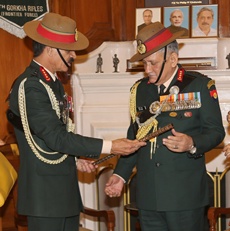Lt Gen Rawat has experience in key areas, insists govt
19 Dec 2016
The government, facing widespread criticism for ignoring seniority in the appointment of Lt Gen Bipin Rawat as the new Army chief, has linked it to the "security situation" in the context of Pakistan, China and terrorism.
 "In the current situation, counter-terrorism and counter-insurgency are key issues," was the response of official sources to criticism that in appointing Rawat, two senior officers had been superseded for the first time since 1983. The two superseded officers are Eastern Army Command chief Lt Gen Praveen Bakshi and Southern Army Command chief Lt Gen P M Hariz.
"In the current situation, counter-terrorism and counter-insurgency are key issues," was the response of official sources to criticism that in appointing Rawat, two senior officers had been superseded for the first time since 1983. The two superseded officers are Eastern Army Command chief Lt Gen Praveen Bakshi and Southern Army Command chief Lt Gen P M Hariz.
A few armed forces veterans were among those who questioned the decision: former UN force commander Lt Gen Iqbal Singh Singha (retd) called it a "surgical strike on the Indian Army".
Pointing out that Rawat had 10 years of experience in counter-insurgency operations and "tremendous hands-on experience in combat areas", a government source said, "He was also involved in the 1986 operations in the eastern sector facing China (at Sumdorong Chu Valley in Arunachal). In the current situation, we need a person with experience in the relevant area - that is operational experience."
Sources maintained that Lt Gen Rawat fulfilled the criteria by virtue of operational assignments as commanding officer of 19 division in Jammu & Kashmir, his "outstanding" track record, familiarity with the Army HQ and his "general dynamism".
Asserting the government's prerogative to select the most eligible officer from a panel, sources emphasised that the final decision was based on "various aspects of the security situation in the country and future scenario". The government took recourse to a series of background briefings to counter criticism that the appointment was controversial, saying that while all officers on the panel were competent, the "prevailing environment and requirements" were key to Lt Gen Rawat's elevation as Army chief.
"He was found best suited ... to deal with emerging challenges, including a reorganised and restructured military force in the north, continuing terrorism and proxy war from the west, and the situation in the northeast," a source said.
The appointment, however, kicked up a storm in political circles, with Congress and the Left asking Prime Minister Narendra Modi to spell out the "compelling reasons" for the move.
Congress spokesman Manish Tewari slammed the government for "playing with institutions" and "doing politics" in the Army and wondered if it was "whimsical cherry picking". Senior Communist Party of India lawmaker D Raja said appointments - whether in the Army, judiciary or those of Central Vigilance Commissioner, acting Central Bureau of Investigation director and to the Central Information Commission - had become controversial.
The government and the Bharatiya Janata Party, however, strongly defended Lt Gen Rawat's elevation over two senior officers. "They are all competent officers but under the prevailing security scenario, the government found Lt Gen Rawat the most suitable candidate. We will urge all political parties to not do politics over it," BJP spokesperson Shrikant Sharma said. He added that there was no other issue involved in promotion of Lt Gen Rawat and pointed to supersessions in the past.
Commenting on the matter, Janata Dal (United) MP Pavan Varma said, "Every question that is being raised is not about politicising an issue but about seeking a clarification or an answer."
Tewari said, "While Lt Gen Rawat, who is being appointed the COAS, may perhaps have all the requisite credentials the fact remains that in a hierarchy-conscious organisation where the principle of seniority is almost sacrosanct, the supersession of three senior officers, Lt Gen Praveen Bakshi, Lt Gen P M Hariz, and perhaps even Lt Gen B S Negi, raises extremely serious and critical questions of institutional integrity."

















